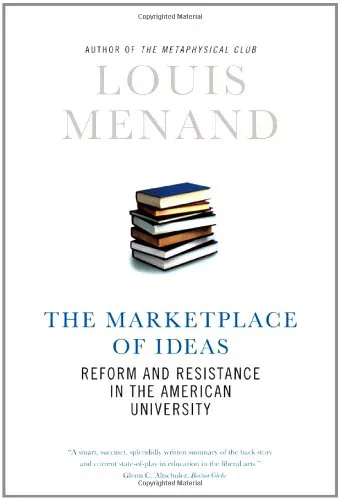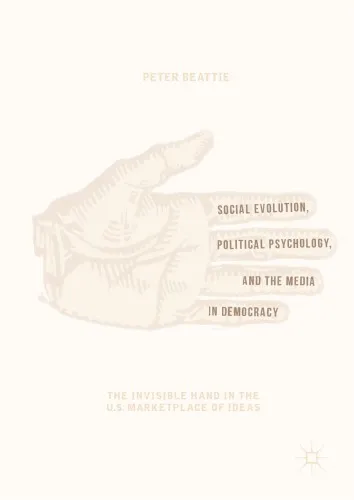The Marketplace of Ideas: Reform and Resistance in the American University (Issues of Our Time)
4.1
بر اساس نظر کاربران

شما میتونید سوالاتتون در باره کتاب رو از هوش مصنوعیش بعد از ورود بپرسید
هر دانلود یا پرسش از هوش مصنوعی 2 امتیاز لازم دارد، برای بدست آوردن امتیاز رایگان، به صفحه ی راهنمای امتیازات سر بزنید و یک سری کار ارزشمند انجام بدینکتاب های مرتبط:
معرفی کتاب: The Marketplace of Ideas
کتاب The Marketplace of Ideas: Reform and Resistance in the American University نوشته لوئیس مناند یکی از جامعترین تحلیلها درباره وضعیت فعلی دانشگاهها در ایالات متحده و مسائل علمی و نهادی آنهاست. این اثر به چهار پرسش کلیدی در خصوص آموزش عالی میپردازد: چرا نوآوریها در این حوزه کند پیش میروند؟ آیا تنوع در محیطهای دانشگاهی واقعاً محقق شده است؟ چرا دانشجویان علوم انسانی کمتر جذب میشوند؟ و چگونه میتوان فرآیند اخذ مدرک PhD را بهینهتر کرد؟ این کتاب با نگاهی انتقادی و پژوهشی، سازوکارهای کنترل، مقاومت و اصلاحپذیری در دانشگاهها را بررسی میکند.
خلاصهای دقیق از کتاب
The Marketplace of Ideas به بررسی نظام آموزشی آمریکا از منظر تاریخی و ساختاری میپردازد. کتاب چهار بخش کلیدی دارد که همگی به شکلی هوشمندانه با یکدیگر مرتبط هستند. در این بخشها، نویسنده عمیقاً به ریشهیابی موضوعاتی چون پروژههای اصلاحطلبی و مقاومتهای نهادی پرداخته است. لوئیس مناند از این منطق بهره میبرد که یونان باستان و کلیساهای اروپای قرون وسطی آغازگر مسیر تحول دانشگاهها بودند، اما در ایالات متحده این روند به دلایل بیشمار - از جمله تأثیرگذاری بازار آزاد و فشارهای فرهنگی - به مسیر منحصر بهفردی کشیده شده است.
یکی از نقاط قوت این اثر، نگاه جامع آن به بحرانهای علوم انسانی است. مناند معتقد است که یکی از دلایل کاهش تعداد دانشجویان در این رشتهها، عدم بازسازی محتوایی و همچنین طولانی و بعضاً طاقتفرسا بودن مسیر دکتری است. او این مسئله را به بحرانهای شغلی و فشارهای اقتصادی ارتباط میدهد. در عین حال، وی اعتقاد دارد که دانشگاهها باید مهارتهای تحلیلی و تفکر انتقادی را تقویت کنند تا در برابر چالشهای جامعه مدرن همچنان پویا بمانند.
نکات کلیدی و آموزههای کتاب
- مقاومت در مقابل اصلاحات نهادی در دانشگاهها مانعی بزرگ برای پیشرفت است.
- علوم انسانی نیازمند تعریف جدیدی است که بتواند ارزش خود را در عصر تکنولوژی و دیجیتال نشان دهد.
- طول دورههای تحصیلی، به ویژه در مقاطع دکتری، باید کوتاهتر و عملیتر شوند.
- تنوع (Diversity) در محیطهای دانشگاهی هنوز به معنای واقعی کلمه محقق نشده و بیشتر به یک شعار شباهت دارد.
- استقلال علمی و تکثرگرایی ارزشهایی هستند که باید از آنها حفاظت کرد تا هویت دانشگاهی زنده بماند.
جملات معروف از کتاب
"Education is not just about filling minds; it's about shaping them for the complexities of life."
"The humanities are not dying; they are asking to be redefined and rediscovered in a world dominated by science and technology."
"Resistance to change is both systemic and cultural within higher education institutions."
چرا این کتاب اهمیت دارد؟
The Marketplace of Ideas اثری است که برای تمامی کسانی که نگران وضعیت فعلی و آینده دانشگاهها و آموزش عالی هستند، حیاتی است. این کتاب به اساتید، دانشجویان، مدیران و سیاستگذاران کمک میکند تا با درک بهتر از مشکلات موجود و موانع پیشرو، تصمیمگیریهای بهتری اتخاذ کنند. علاوه بر این، مناند با توانایی منحصر به فرد خود در تحلیل و ترکیب اطلاعات، ارتباط میان سیاستهای نهادی و روندهای اجتماعی را روشن میسازد.
در جهانی که سرعت تحولات هر روز افزایش مییابد، این کتاب به ما نشان میدهد که اگر آموزش و دانشگاه بخواهند همچنان به عنوان موتور اصلی پیشرفت باقی بمانند، نیازمند اصلاحات بنیادی هستند. در نهایت، The Marketplace of Ideas نه تنها تحلیلی عمیق از حال و آینده دانشگاههاست، بلکه دعوتی به گفتگو برای یافتن راهحلهای جدید و خلاقانه است.
Introduction
The American university system stands as one of the most revered institutions in modern society, heralded for its ability to create knowledge, foster critical thought, and produce innovative solutions to the challenges of the world. However, the contemporary university also finds itself at a crossroads—struggling to reconcile its historical foundations with the growing demands of the 21st century. In The Marketplace of Ideas: Reform and Resistance in the American University, I, Louis Menand, delve deeply into the structure, culture, and crises of academic life, examining both its remarkable achievements and the entrenched challenges within this evolving space.
Through a critical yet balanced lens, the book explores the intellectual ideas and institutional norms that shape the American higher education system. It probes into why innovation within academia often meets resistance, where reform efforts succeed or fail, and how the ideas that dominate universities are both reflective of and isolated from broader societal patterns. By unraveling these themes, I aim to ignite meaningful discussion about how universities can adapt while preserving their critical mission of educating future generations.
Detailed Summary of the Book
At its core, The Marketplace of Ideas examines four key questions that lie at the heart of discussions about higher education today. These include:
- The challenges of curricular reform and why it is often so difficult.
- The rationale and consequences of academic specialization and its impact on intellectual collaboration.
- The relationship between the liberal arts and professional education in shaping the goals of universities.
- The historical and ongoing struggles that the tenure system creates for academia as both a workplace and a research incubator.
Through these questions, I analyze how the American academic system developed its current structures and what forces have shaped it over time, particularly since the mid-20th century. By tracing the historical roots of academic professionalization, examining the rise of disciplinary silos, and questioning the changing purposes of education, this book illustrates the paradoxes that define modern universities. Despite being pillars of progress, higher education institutions often cling tightly to historical traditions that limit their ability to innovate or reform effectively. These practical and philosophical tensions, when combined, result in an academic culture resistant to change, even in the face of existential pressures.
Key Takeaways
Here are some of the most important insights from The Marketplace of Ideas:
- Curricular reform is a slow and politically fraught process: Universities rarely adopt sweeping changes to undergraduate or graduate programs due to entrenched institutional cultures and competing interests among faculty members.
- The rise of specialization narrows intellectual engagement: While specialization has allowed for tremendous depth of knowledge, it has also fostered academic silos that hinder cross-disciplinary collaboration and comprehensive problem-solving.
- The liberal arts remain vital but contested: While advocates argue for the inherent value of a liberal arts education, the rise of professional programs and market-driven approaches to education have often placed this tradition under threat.
- The tenure system is both a safeguard and a stumbling block: While tenure protects academic freedom, it also resists meaningful reform and creates a paradoxical rigidity in an otherwise dynamic intellectual space.
Famous Quotes from the Book
Here are a few thought-provoking quotes from The Marketplace of Ideas:
"Universities produce knowledge, but universities are also organizations, and the way they are organized affects the way they produce knowledge."
"The problem with reform is not the lack of good ideas but the resistance to abandoning old ones."
"Specialization has made expertise more profound, but it has also made the university a collection of isolated domains."
Why This Book Matters
Higher education plays a critical role not just in individual lives but also in shaping public policy, economic development, and cultural values. By critically examining the American university system, The Marketplace of Ideas illuminates the often-overlooked structural and cultural barriers to reform within institutions of higher learning. These discussions matter greatly today, as universities grapple with diminishing funding, rising calls for diversification, and the increasing need to adapt to technological innovation and global interconnectedness.
Readers—whether educators, administrators, students, or policymakers—will find this book an invaluable resource for understanding why universities operate the way they do and how they might evolve in the face of both internal and external challenges. At its heart, this book argues that while universities face immense resistance to change, they retain their potential to transform society by fostering critical thought, intellectual collaboration, and innovation. These values are worth defending, and this book provides the intellectual framework for doing so.
دانلود رایگان مستقیم
You Can Download this book after Login
دسترسی به کتابها از طریق پلتفرمهای قانونی و کتابخانههای عمومی نه تنها از حقوق نویسندگان و ناشران حمایت میکند، بلکه به پایداری فرهنگ کتابخوانی نیز کمک میرساند. پیش از دانلود، لحظهای به بررسی این گزینهها فکر کنید.
این کتاب رو در پلتفرم های دیگه ببینید
WorldCat به شما کمک میکنه تا کتاب ها رو در کتابخانه های سراسر دنیا پیدا کنید
امتیازها، نظرات تخصصی و صحبت ها درباره کتاب را در Goodreads ببینید
کتابهای کمیاب یا دست دوم را در AbeBooks پیدا کنید و بخرید
1299
بازدید4.1
امتیاز50
نظر98%
رضایتنظرات:
4.1
بر اساس 0 نظر کاربران
"کیفیت چاپ عالی بود، خیلی راضیام"



